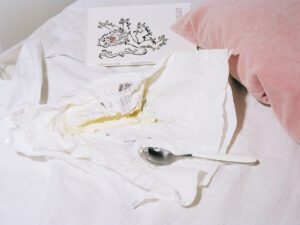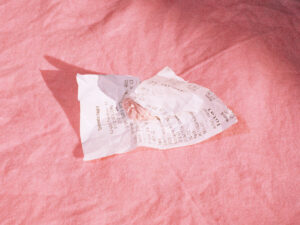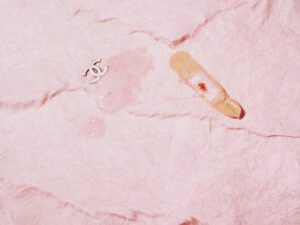


On Desire



Women
I don’t know, Jake.
I do not understand women.
Right now I feel like one.
I don’t know what women want
But I know that the ones I like
Are not the hags
Who put one arm around you
(In this scenario you
Are the younger woman)
And say You get to a point in your life.
Fuck those bitches
Who try to poison desperate girls
With their resigned and shitty worldviews.
Women. They have got to feel desire.
Me too. I’ve got to feel it.
…”
– coeur de lion – ariana reines
i read coeur de lion during my first year at the ba programme.
i read it twice the first 24 hours, while spooning the inside of a brie cheese. i was working on a project on self-control at the time; expectations and fear.
most of the photos were staged, but this one, portraying the book and the brie cheese in my bed, was taken in the act of indulgence & (post)anorectic shame. though that act in itself meant pushing the edge of what my restricted brain could currently fit in terms of control; i remember feeling both exhilarated and tranquil; as if almost forgiven by the literature.
i was stunned by how it made time feel quieter, like the air was somehow cooler, calm. like nothing existed outside the realm of what i could currently see and feel.
i’ve been thinking a lot about desire lately. what it is. the function of it.
my relation to it.
and the, through our culture, historical pattern of labeling it as a dichotomistic good vs bad. i’m not a fan of binary categorizing, might fall into it more often than wished for, though;
i really try to think beyond dualities such as right and wrong;
learn how to move within grey areas.
i’m drawn to the conflicts that i find the most complex and contradicting within myself; where the imposed and the desired overlap. always unsure; flickering thoughts. sprung from some kind of need to understand myself; i deal with the personal, with aim to find, or understand, something general.
in reaction,
(i speak only for myself when i say: you might relate to this too)
my work might come off as problematic (a favorite word of our era). other times it might be that my art may appear good willed; edifying.
though, neither of those are my agenda; please don’t confuse them as such.
the outcome of my art is a pure result of overthinking; self-centrism, (and a hint of being exhibitionistic ;)). that is not to say that my art isn’t political, it might be very much so; though i’m convinced that the socially critical function of art lies beyond the socially critical artistry.
i find there to be a danger in the strive to create solely out of goodwill; it displaces the content of artistry from the art itself to the artist; claiming unselfishness; purity.
indirectly; it plays along with the idea of virginity.
the political force of art does not lie within statements, but in the urge to create. to express and to feel. without it, the urge; without desire, art loses its affective force. yes, art can be political. but to successfully be, it needs to be free from the requirement to be. as herbert marcuse so nicely phrased it;
Literature can be called revolutionary in a meaningful sense only with reference to itself, as content having become form. The political potential of art lies only in its own aesthetic dimension. Its relation to praxis is inexorably indirect, mediated, and frustrating. The more immediately political the work of art, the more it reduces the power of estrangement and the radical, transcendent goals of change.
to be rough, i want to differ between explorative and pointing art (not to claim that i only participate in the former) by referring to what roland barthes calls ‘unary photographs’. the photographs that he explained as ‘transforming “reality” without doubling it. without adding duality, indirection or disturbance’. in other words; photographs that have no other purpose than to show. by using this verbalization, he separates the erotic photograph from the pornographic, as it is a ‘pornographic that has been disturbed, fissured.’
; the pointing art might be an easy way out; it eliminates the risk of being misread. show the viewer that you mean well! yes, the pointing, unary art might be easy understood, but makes for nothing else than mediocrity. it makes for the artist to say: i’m selfless. and for the viewer to respond: you and me both. no radicalism is needed to agree with a point that has already been proven. the pointing art only makes for pornographic moralism; and the indulgence of it.
it lacks potential; it lacks desire.
more than anything, i find it to be narcissistic, even dishonest. there’s nothing humble in denying personal self-interest. if anything, it is an act of avoidance; avoidance out of fear from coming off as selfish. which in itself is a fear based not only on individualistic grounds, (admit that you’re not unique, and your personal will forever be universal) but on the misunderstanding that it is the artist’s duty to influence rather than to capture and reflect; since when is art supposed to provide answers? as if the world consists of a singular truth. maybe not everything has to be understood, maybe some things can exist just by being felt. leave some room for ambiguity. ambivalence. maybe try for once not to verbalize it. allow yourself to feel beyond your morals. lose yourself a second. the ground won’t disappear.
we assign the artists of today this responsibility of criticism that not only narrows down the path of creating but how to look at art. almost as if the art doesn’t reflect society but overshadows it as a false duplicate. some version left to the future as to claim we are something we are not. leaving the entire reality as some kind of impostor; unable to live up to its own framework. i guess it originates in fear. maybe it is a lack of trust. or an eagerness to know what’s right. a feeling of being constantly watched. the idea of being ‘good’ is only the constant risk of being ‘bad’ hovering above. as through history ‘femininity’ has been, and still is, tied to restrictions; sex, food, thoughts, pleasure; giving in to desire frightens me as well. as if it would reveal something about me beyond my control.
now, desire; what it is; my relation to it. (how it came to mean so much more to me.)
coeur de lion along with several other titles; finding literature kinda introduced and opened up for my obsession with filth and humor. this era defines kind of a shift for me. the realization that banalities can be treated as wanted by the author made my world grow wider.
coeur de lion is beyond dichotomies; it’s permissive. it is desire. it moves me to a place where i can breathe. the feeling i first felt reading the book, i now recognize in hermes formulation of it as; content having become form
it wasn’t until later i found that on the last page, was a black and white photo of a 150g,
compagnie de fromages, coeur de lion, camembert cheese. 150g of desire. 150g of lack of self-control. desire, must be, what makes the purposelessness of life bearable. to give in to desire you need to fully allow yourself to feel without restriction; desire doesn’t know good or bad. it’s like;
produce and reproduce until there is no original
until (u) forget what (the) desire was in the first place
until (u) can recognize a vulnerability free from attachment
beyond reason or function;
if i deny my own thoughts
because they don’t align
with the current collective idea
of goodness
then i deny myself desire
if i deny myself desire
then i as well
deny you yours;
i deny us both vulnerability;
humanity
desire.
is all the things i want
even though i technically
don’t need it
desire.
must be the meaningless force
giving the meaningless life
a meaning.
Bibliography:
Reines, Ariana. Coeur de lion. 2nd ed. New York: Fence Books, 2011.
Broder, Melissa. Milk Fed. London: Bloomsbury, 2021.
Barthes, Roland. Camera Lucida. New York: Hill & Wang, 1981.
Marcuse, Herbert. The Aesthetic Dimension. Boston: Beacon Press, 1978.
& some related listening:
https://redscarepodcast.libsyn.com/cant-get-you-out-of-my-head-w-adam-curtis-unlocked